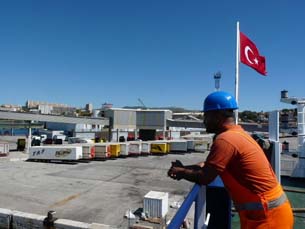 More complex than the liberalisation of goods, the liberalisation of services involves the reduction of regulatory barriers to market access and national treatment. Researchers have shed light on the difficulties of the liberalisation of services in a Femise report (FEM32-02). The case study focuses on five services in Poland and Turkey.
More complex than the liberalisation of goods, the liberalisation of services involves the reduction of regulatory barriers to market access and national treatment. Researchers have shed light on the difficulties of the liberalisation of services in a Femise report (FEM32-02). The case study focuses on five services in Poland and Turkey.
Removing the barriers and allowing services to be opened up to foreigners… In practical terms, things are much more complicated than they seem. It is hardly easy to transpose a Turkish accounting method to a foreign accounting method, because regulations in this regard are generally speaking not highly transposable.
Subidey Togan, from the International University of Turkey, and Jan Michalek, from the Faculty of Economics and Science in Warsaw, went through the liberalisation of five categories of services with a fine-tooth comb: air, road and rail transport, accounting services and the health sector in Poland and Turkey. Entitled “Liberalisation of Services in Poland and Turkey: A Comparative Analysis”, this study, published in the context of a FEMISE research programme (FEM32-02), reveals disparities depending on the country and type of service. “Liberalisation of services is a difficult task. It involves reducing the regulatory barriers to market access and to discriminatory national treatment (…)” indicate the two authors.
Turkey benefits from a relatively competitive road transport market
In air transport, hitherto both heavily regulated and highly protected, Poland, an EU member, has introduced the successive packages of EU Directives. This liberalisation has led to a noticeable rise in passenger traffic. Turkey, a candidate for joining the European market, followed the same strategy. But Turkey remains in the middle of the table concerning the degree to which its air transport is liberalised.
On the other hand, in terms of road transport, Turkey shows signs of great vitality; to the point that it has become a concern for French transporters, who fear national coastal shipping operations. A concrete example can currently be seen with the opening, in July 2010, of a maritime transport service between Turkey and France. Initiated by the Turkish Road Transporters Federation, it supplies markets in the north and south of Europe. “Turkey benefits from a relatively competitive road transport market, compared with the EU and Poland. But the degree of discrimination towards foreign presence remains high”, indicate the authors of the report. The fears of the “Polish plumber” coming to take over the French market remain!
In the accountancy and health sectors, liberalisation levels are minimal. Despite efforts made by Turkey since 2003 to encourage direct foreign investment, “differences in accounting principles are an obstacle to such flows” and this country is one of those markets which is most resistant in this regard. The quality of the health service remains poor in both Turkey and in Poland, given that the two countries devote a minimal fraction of their revenues to this sector. There remains a long way to go to reach an alignment of regulatory regimes!
The FEM32-02 report is available on the FEMISE website here.
Photo by NBC, Econostrum.
Article by Nathalie Bureau du Colombier, Econostrum. It belongs to a series of articles published in the context of the partnership between Econostrum and Femise for the year 2010. These articles also feed the “Grand Angle” part of the Econostrum Website. You can find this topic and all information at the following address: www.econostrum.info. Registration for the Econostrum newsletter is available here:http://www.econostrum.info/subscription/


